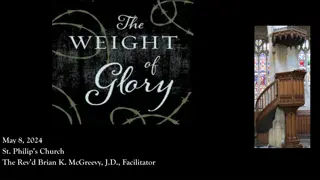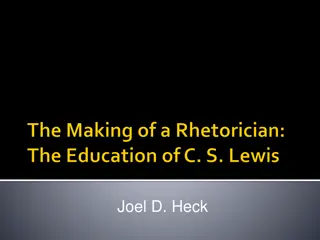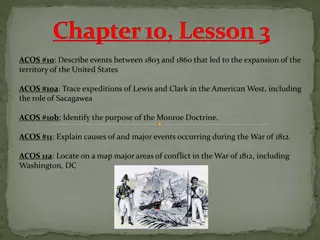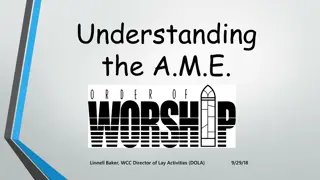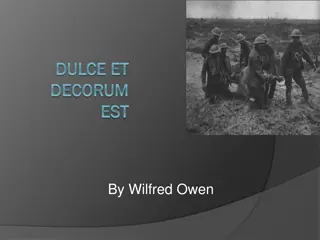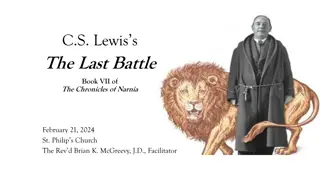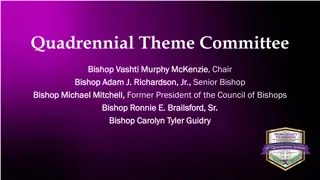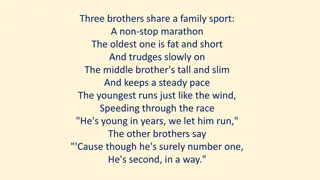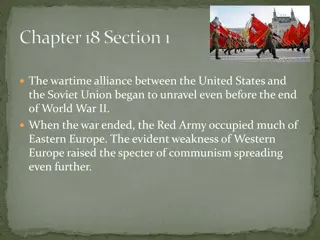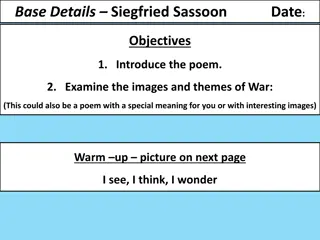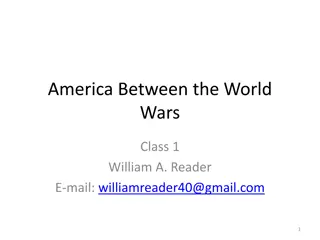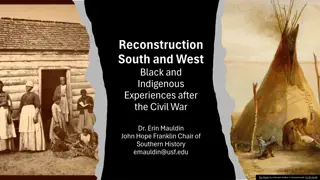Exploring C.S. Lewis' Sermons in the Context of World War II
Delve into C.S. Lewis' impactful sermons given during World War II and the turbulent times in England, focusing on themes of faith, inner strength, and contemplation in the face of adversity. The sermons, such as "Learning in War-time" and "The Weight of Glory," offer profound insights that resonate even in modern times. Discover the historical backdrop, significance, and timeless wisdom of Lewis' teachings amidst the chaos of war.
Download Presentation

Please find below an Image/Link to download the presentation.
The content on the website is provided AS IS for your information and personal use only. It may not be sold, licensed, or shared on other websites without obtaining consent from the author. Download presentation by click this link. If you encounter any issues during the download, it is possible that the publisher has removed the file from their server.
E N D
Presentation Transcript
April 17, 2024 St. Philip s Church The Rev d Brian K. McGreevy, J.D., Facilitator
So we do not lose heart. Though our outer selfis wasting away, our inner self is being renewed day by day. For this light momentary affliction is preparing for us an eternal weight of glory beyond all comparison, as we look not to the things that are seen but to the things that are unseen. For the things that are seen are transient, but the things that are unseen are eternal. 2 Corinthians 4:16-18 April 10, 2024 St. Philip s Church
How to approach this class: --On the beach --Snorkeling --Scuba diving --Email list How to read this book: --Try reading aloud and slowly, looking for layers of meaning --Look for themes/underline and highlight passages that resonate with you April 10, 2024 St. Philip s Church The Rev d Brian K. McGreevy, J.D., Facilitator
The Book A collection of sermons and addresses given by C.S. Lewis during World War II and shortly thereafter 1. The Weight of Glory--June 8, 1941: Church of St. Mary the Virgin, Oxford 2. Learning in War-time--October 22, 1938: Church of St. Mary the Virgin, Oxford 3. Transposition--May 28, 1944: Chapel of Mansfield College, Oxford 4. Is Theology Poetry?--November 6, 1944: Socratic Club, Oxford 5. The Inner Ring-- December 14, 1944: King s College, University of London 6. Membership February 10, 1945: Society of St. Alban and St. Sergius, Oxford 7. On Forgiveness--August 28, 1947: Church of St. Mary s, Sawston, Cambridgeshire 8. A Slip of the Tongue--January 29, 1956:. Chapel of Magdalene College, Cambridge We will be focusing on only two of these, Learning in War-time and The Weight of Glory, but all of them are well worth reading!
Context: England in War-time 1939 September 3 Following Hitler s aggression, England and France declare war on Germany October 22 Lewis preaches Learning in War-time sermon in Oxford 1940 September 7 The Blitz begins, with nightly devastating bombing raids on London for months 1941 February 7 Lewis invited to give talks on BBC April 9 Lewis gives first wartime RAF talk In the month before Lewis preached The Weight of Glory, Greece falls to Hitler, as does Yugoslavia, and bombs continue to fall on London, hitting Parliament and St. Paul s Cathedral June 8 Lewis delivers The Weight of Glory sermon in Oxford August 6 First BBC talk by Lewis 1944 June 6, 1944 D-Day invasion of Normandy 1945 March 29, 1945 Final German bombing raid on England May 8, 1945 Churchill declares VE Day as Germany surrenders July 16, 1945 Lewis gives last RAF talk
Context: England in War-time Context--Lewis and the Inklings in Wartime: 1939 Lewis begins writing The Problem of Pain at the request of Ashley Sampson of Centenary Press March 29 Tolkien does three day program of code and cipher training for the government in London August 31--Civilian evacuations from London begin September 1 Germany invades Poland; Warnie Lewis called up for active duty in British Armed Forces September 2 Four evacuee children from London arrive at the Kilns; various evacuee children will be there off and on until 1945 September 2--Charles Williams and the Oxford University Press move to Oxford from London because of the imminent war September 3 Responding to Hitler s aggression, England and France declare war on Germany 1940 January 8 Rationing begins in England February Charles Williams becomes a lecturer at Oxford University March Lewis publishes The Problem of Pain, which is read and lauded by the Rev. James Welch, Head of Religious Broadcasting for the BBC May 10 Nazis invade France, Belgium, and the Netherlands; Churchill named Prime MinisterMay 26--Dunkirk evacuation begins June 3 Germans bomb Paris; Dunkirk evacuation ends July 5 Lewis has the idea for The Screwtape Letters July 10 Battle of Britain begins August 23 First German air raids on London August 25 British air raids on Germany begin September 7 German Blitz against Britain begins with 348 bombers and 617 fighter planes, continuing until May 11, 1941; During the 8 months of the Blitz, 43,000 civilians were killed. One of every six Londoners was made homeless and at least 1.1 million houses and flats were damaged or destroyed. September 16 Langham Hotel adjacent to BBC bombed October 15 BBC Broadcasting House struck by bomb; seven killed November 14 Massive German bombing of Coventry December 8 BBC Broadcasting House and All Souls struck by bombs December 29 Massive German bombing of London 1941 February 7 Lewis invited to give talks on BBC April 9 Lewis gives first wartime RAF talk May 2 Lewis publishes The Screwtape Letters in serial form May 10 Massive German bombing of London; Queen s Hall adjacent to Broadcasting House destroyed June 8 Lewis delivers The Weight of Glory sermon in Oxford August 6 First BBC talk by Lewis1944 June 6, 1944 D-Day invasion of Normandy 1945 March 29, 1945 Final German bombing raid on England May 8, 1945 Churchill declares VE Day as Germany surrenders July 16, 1945 Lewis gives last RAF talk
The venue: The University Church of St. Mary the Virgin, Oxford
The two Oxford sermons at the Church of St. Mary the Virgin: Learning in War-time and The Weight of Glory --Canon T. Richard ( Dick ) Milford, Vicar of St Mary s and Lewis s contemporary, issued the invitation to Lewis for both these sermons. Milford had been impacted by The Pilgrim s Regress (1933), Lewis s first Christian book. --On October 22, 1939, six weeks after England and France declared war on Germany, Lewis preached None Other Gods: Culture in War-Time for Sunday evening Evensong at St. Mary s, published later as Learning in War-Time. --On June 8, 1941, at the height of the war and after eight months of the Blitz bombings of London, Lewis returned to preach at St. Mary s at Evensong, this time preaching The Weight of Glory to an overflow crowd perhaps the largest crowd ever assembled there, with every seat taken, people sitting in the aisles and windows, and gathered outside.
Learning in War-time Setting the Stage for The Weight of Glory Lewis asks how any of us can think it worthwhile to begin what we probably cannot finish, or to engage in tranquil or flippant activities when there is life-and-death urgency at hand, but points out that humanity is always facing crises in ways that war amplifies. "The war creates no absolutely new situation: it simply aggravates the permanent human situation so that we can no longer ignore it. Human life has always been lived on the edge of a precipice. Human culture has always had to exist under the shadow of something infinitely more important than itself. If men had postponed the search for knowledge and beauty until they were secure the search would never have begun. He has in mind not only that we lurch from wars, to disasters, to tyrannies, but that we at all times have before us the question of our eternal destiny. It is part of our nature, he suggests, to create, reason, and laugh in the midst of pending disaster. We may indeed have to die to save others, or die for our country and our freedom, but these are not what the whole of our lives are for. Moreover, if you suspend your whole intellectual and aesthetic activity, you would only succeed in substituting a worse cultural life for a better.: if you don't read good books you will read bad ones. If you don't go on thinking rationally, you will think irrationally. If you reject aesthetic satisfactions you will fall into sensual satisfactions. Let us not throw down our intellectual weapons just when they are most needed against our enemies: Good philosophy must exist, if for no other reason, because bad philosophy needs to be answered. One must defend against the three enemies which war raises up against the scholar: --Excitement the tendency to think and feel about the war when we had intended to think about our work --Frustration -- the feeling that we shall not have time to finish. It is ever so. The present is the only time in which any work can be done or any grace received. --Fear--because war threatens us with death and pain. Lewis does not encourage stoic indifference, but a very grounded reality. He welcomes the shattering of any illusions we might have had that humanity is building heaven on earth.
The Weight of Glory Preached June 8, 1941 As Lewis had preached in Learning in War-time, man is always on the precipice, and worthy pursuits must be pursued even in times of extremity, especially within the framework of understanding our eternal destiny and the importance of the quest for knowledge and Beauty. In the darkest days of World War II where life was uncertain and death was a present reality, providing a framework for understanding Heaven and Eternity was enormously important, and that is what Lewis addresses in this sermon. We will cover the sermon in four parts, looking at key themes. Tonight we will begin with the first section, looking at the themes of Unselfishness, love, desire, and rewards.
The Weight of Glory: References in the first section Immanuel Kant (1724-1804) Philosopher known for the categorical imperative, which is a universal ethical principle stating that one should always respect the humanity of others, and that one should only act in accordance with rules that could hold for everyone. Stoicsa school of philosophy from ancient Greece holding that the wise man should be free from passion, unmoved by joy or grief, and submissive to natural law while pursuing virtue. Sophoclesancient Greek tragedian of the 5th century BC best known for his plays Oedipus Rex and Antigone. Percy Bysshe Shelley (1792-1822) one of the greatest English Romantic poets known for such works as Ozymandias and Prometheus Unbound. Algernon Charles Swinburne (1837-1909)Engish poet and writer who often addressed inappropriate or decadent topics. Xenophon Greek military leader, orator, and philosopher of the 4th century BC whose works were often used in translation exercises for students. John Milton (1608-1674) English author and poet best known as the author of Paradise Lost Aeschylus Greek playwright of the 5thcentury BC often regarded as the father of Tragedy, best known for The Oresteia
If you asked twenty good men to-day what they thought the highest of the virtues, nineteen of them would reply, Unselfishness. But if you had asked almost any of the great Christians of old he would have replied, Love. You see what has happened? A negative term has been substituted for a positive, and this is of more than philological importance. The negative ideal of Unselfishness carries with it the suggestion not primarily of securing good things for others, but of going without them ourselves, as if our abstinence and not their happiness was the important point. I do not think this is the Christian virtue of Love. The New Testament has lots to say about self-denial, but not about self-denial as an end in itself. We are told to deny ourselves and to take up our crosses in order that we may follow Christ; and nearly every description of what we shall ultimately find if we do so contains an appeal to desire. If there lurks in most modern minds the notion that to desire our own good and earnestly to hope for the enjoyment of it is a bad thing, I submit that this notion has crept in from Kant and the Stoics and is no part of the Christian faith. Indeed, if we consider the unblushing promises of reward and the staggering nature of the rewards promised in the Gospels, it would seem that our Lord finds our desires, not too strong, but too weak. We are half-hearted creatures, fooling about with drink and sex and ambition when infinite joy is offered us, like an ignorant child who wants to go on making mud pies in a slum because he cannot imagine what is meant by the offer of a holiday at the sea. We are far too easily pleased. We must not be troubled by unbelievers when they say that this promise of reward makes the Christian life a mercenary affair. There are different kinds of reward. There is the reward which has no natural connexion with the things you do to earn it and is quite foreign to the desires that ought to accompany those things. Money is not the natural reward of love; that is why we call a man mercenary if he marries a woman for the sake of her money. But marriage is the proper reward for a real lover, and he is not mercenary for desiring it. A general who fights well in order to get a peerage is mercenary; a general who fights for victory is not, victory being the proper reward of battle
as marriage is the proper reward of love. The proper rewards are not simply tacked on to the activity for which they are given, but are the activity itself in consummation. There is also a third case, which is more complicated. an enjoyment of Greek poetry is certainly a proper, and not a mercenary, reward for learning Greek; but only those who have reached the stage of enjoying Greek poetry can tell from their own experience that this is so. The schoolboy beginning Greek grammar cannot look forward to his adult enjoyment of Sophocles as a lover looks forward to marriage or a general to victory. He has to begin by working for marks, or to escape punishment, or to please his parents, or, at best, in the hope of a future good which he cannot at present imagine or desire. His position, therefore, bears a certain resemblance to that of the mercenary; the reward he is going to get will, in actual fact, be a natural or proper reward, but he will not know that till he has got it. Of course, he gets it gradually; enjoyment creeps in upon the mere drudgery, and nobody could point to a day or an hour when the one ceased and the other began. But it is just in so far as he approaches the reward that he becomes able to desire it for its own sake; indeed, the power of so desiring it is itself a preliminary reward. The Christian, in relation to heaven, is in much the same position as this schoolboy. Those who have attained everlasting life in the vision of God doubtless know very well that it is no mere bribe, but the very consummation of their earthly discipleship; but we who have not yet attained it cannot know this in the same way, and cannot even begin to know it at all except by continuing to obey and finding the first reward of our obedience in our increasing power to desire the ultimate reward. Just in proportion as the desire grows, our fear lest it should be a mercenary desire will die away and finally be recognized as an absurdity. But probably this will not, for most of us, happen in a day; poetry replaces grammar, gospel replaces law, longing transforms obedience, as gradually as the tide lifts a grounded ship. But there is one other important similarity between the schoolboy and ourselves. If he is an imaginative boy he will, quite probably, be revelling in the English poets and romancers suitable to his age some time before he begins to
suspect that Greek grammar is going to lead him to more and more enjoyments of this same sort. He may even be neglecting his Greek to read Shelley and Swinburne in secret. In other words, the desire which Greek is really going to gratify already exists in him and is attached to objects which seem to him quite unconnected with Xenophon and the verbs in Greek. Now, if we are made for heaven, the desire for our proper place will be already in us, but not yet attached to the true object, and will even appear as the rival of that object. And this, I think, is just what we find. no doubt there is one point in which my analogy of the schoolboy breaks down. The English poetry which he reads when he ought to be doing Greek exercises may be just as good as the Greek poetry to which the exercises are leading him, so that in fixing on Milton instead of journeying on to Aeschylus his desire is not embracing a false object. But our case is very different. If a transtemporal, transfinite good is our real destiny, then any other good on which our desire fixes must be in some degree fallacious, must bear at best only a symbolical relation to what will truly satisfy.
Unselfishness versus Love If you asked twenty good men to-day what they thought the highest of the virtues, nineteen of them would reply, Unselfishness. But if you had asked almost any of the great Christians of old he would have replied, Love. You see what has happened? A negative term has been substituted for a positive, and this is of more than philological importance. The negative ideal of Unselfishness carries with it the suggestion not primarily of securing good things for others, but of going without them ourselves, as if our abstinence and not their happiness was the important point. I do not think this is the Christian virtue of Love. The New Testament has lots to say about self-denial, but not about self-denial as an end in itself. Since you have purified your souls in obeying the truth through the Spirit in sincere love of the brethren, love one another with a pure heart fervently I Peter 1:22 So now faith, hope, and love abide, these three; but the greatest of these is love. I Cor. 13:13 And one of them, a lawyer, asked him a question to test him. Teacher, which is the great commandment in the Law? And he said to him, You shall love the Lord your God with all your heart and with all your soul and with all your mind. This is the great and first commandment. And a second is like it: You shall love your neighbor as yourself. Mt. 22:35-39 Let love be genuine. Abhor what is evil; hold fast to what is good. Love one another with brotherly affection. Outdo one another in showing honor Romans 12:9-10
Desire We are told to deny ourselves and to take up our crosses in order that we may follow Christ; and nearly every description of what we shall ultimately find if we do so contains an appeal to desire If there lurks in most modern minds the notion that to desire our own good and earnestly to hope for the enjoyment of it is a bad thing, I submit that this notion has crept in from Kant and the Stoics and is no part of the Christian faith. Indeed, if we consider the unblushing promises of reward and the staggering nature of the rewards promised in the Gospels, it would seem that our Lord finds our desires, not too strong, but too weak. We are half-hearted creatures, fooling about with drink and sex and ambition when infinite joy is offered us, like an ignorant child who wants to go on making mud pies in a slum because he cannot imagine what is meant by the offer of a holiday at the sea. We are far too easily pleased. Then Jesus said to His disciples, If anyone desires to come after Me, let him deny himself, and take up his cross, and follow Me. For whoever desires to save his life will lose it, but whoever loses his life for My sake will find it. Mt. 16:24-25 Blessed are those who are persecuted for righteousness' sake, for theirs is the kingdom of heaven. Blessed are you when others revile you and persecute you and utter all kinds of evil against you falsely on my account. Rejoice and be glad, for your reward is great in heaven Mt. 5:10-12 Peter began to say to him, See, we have left everything and followed you. Jesus said, Truly, I say to you, there is no one who has left house or brothers or sisters or mother or father or children or lands, for my sake and for the gospel, who will not receive a hundredfold now in this time, houses and brothers and sisters and mothers and children and lands, with persecutions, and in the age to come eternal life. Mark 10:28-30
Rewards We must not be troubled by unbelievers when they say that this promise of reward makes the Christian life a mercenary affair. There are different kinds of reward. There is the reward which has no natural connexion with the things you do to earn it and is quite foreign to the desires that ought to accompany those things. Money is not the natural reward of love; that is why we call a man mercenary if he marries a woman for the sake of her money. But marriage is the proper reward for a real lover, and he is not mercenary for desiring it. A general who fights well in order to get a peerage is mercenary; a general who fights for victory is not, victory being the proper reward of battle as marriage is the proper reward of love. The proper rewards are not simply tacked on to the activity for which they are given, but are the activity itself in consummation. There is also a third case, which is more complicated. an enjoyment of Greek poetry is certainly a proper, and not a mercenary, reward for learning Greek; but only those who have reached the stage of enjoying Greek poetry can tell from their own experience that this is so. The schoolboy beginning Greek grammar cannot look forward to his adult enjoyment of Sophocles as a lover looks forward to marriage or a general to victory. He has to begin by working for marks, or to escape punishment, or to please his parents, or, at best, in the hope of a future good which he cannot at present imagine or desire. His position, therefore, bears a certain resemblance to that of the mercenary; the reward he is going to get will, in actual fact, be a natural or proper reward, but he will not know that till he has got it. Of course, he gets it gradually; enjoyment creeps in upon the mere drudgery, and nobody could point to a day or an hour when the one ceased and the other began. But it is just in so far as he approaches the reward that he becomes able to desire it for its own sake; indeed, the power of so desiring it is itself a preliminary reward.
Blessed is the man who remains steadfast under trial, for when he has stood the test he will receive the crown of life, which God has promised to those who love him. Jas. 1:2 But, as it is written, What no eye has seen, nor ear heard, nor the heart of man imagined, what God has prepared for those who love him I Cor. 2:9 Do not lay up for yourselves treasures on earth, where moth and rust destroy and where thieves break in and steal, but lay up for yourselves treasures in heaven, where neither moth nor rust destroys and where thieves do not break in and steal. For where your treasure is, there your heart will be also. Mt. 6:19-21 Deeper Dive: The Schoolboy Lewis Learns Greek From C.S. Lewis s autobiography Surprised by Joy In 1913 at the age of 14 Lewis entered Malvern College, one of England s most prestigious public schools. The Classics Master, Harry Wakelyn Smith (nicknamed "Smewgy" by the students) had a tremendous impact on Lewis as he learned Latin and Greek: "He could enchant but he could also analyze An idiom or a textual crux, once expounded by Smewgy, became clear as day. He made us feel that the schola's demand for accuracy was not merely pedantic, still less an arbitrary moral discipline, but rather a niceness, a delicacy, to lack which argued " a gross and swainish disposition. The following year, at age 15, Lewis was sent to Great Bookham in Surrey to begin an intensive course of study with academic William T. Kirkpatrick (fondly nicknamed The Great Knock ) to prepare Lewis to sit for the entrance examinations for Oxford in 1916. Of Kirkpatrick, Lewis said My debt to him is very great, my reverence to this day undiminished.
Deeper Dive: The Schoolboy Lewis Learns Greek From C.S. Lewis s autobiography Surprised by Joy I arrived at Gastons (so the Knock s home was called) on a Saturday, and he announced that we would begin Homer on Monday. I explained that I had never read a word in any dialect but the Attic, assuming that when he knew this he would approach Homer through some preliminary lessons on the Epic language. He replied merely with a sound very frequent in his conversation which I can only spell Huh . I found this rather disquieting; and I woke on Monday saying to myself, Now for Homer. Golly! The name struck awe into my soul. At nine o clock we sat down to work in the little upstairs study which soon became so familiar to me. It contained a sofa (on which we sat side by side when he was working with me), a table and chair (which I used when I was alone), a bookcase, a gas stove, and a framed photograph of Mr. Gladstone. We opened our books at Iliad, Book I. Without a word of introduction Knock read aloud the first twenty lines or so in the new pronunciation, which I had never heard before. Like Smewgy, he was a chanter; less mellow in voice, yet his frill gutturals and rolling R s and more varied vowels seemed to suit the bronze-age epic as well as Smewgy s honey tongue had suited Horace. For Kirk, even after years of residence in England, spoke the purest Ulster. He then translated, with a few, a very few explanations, about a hundred lines. I had never seen a classical author taken in such large gulps before. When he had finished he handed me over Crusius Lexicon and, having told me to go through again as much as I could of what he had done, left the room. It seems an odd method of teaching, but it worked. At first I could travel only a very short way along the trail he had blazed, but every day I could travel further. Presently I could travel the whole way. Then I
could go a line or two beyond his furthest North. Then it became a kind of game to see how far beyond. He appeared at this stage to value speed more than absolute accuracy. The great gain was that I very soon became able to understand a great deal without (even mentally) translating it; I was beginning to think in Greek. That is the great Rubicon to cross in learning any language. Those in whom the Greek word lives only while they are hunting for it in the lexicon, and who then substitute the English word for it, are not reading the Greek at all; they are only solving a puzzle. The very formula, Naus means a ship, is wrong. Naus and ship both mean a thing, they do not mean one another. Behind Naus, as behind navis or naca, we want to have a picture of a dark, slender mass with sail or oars, climbing the ridges, with no officious English word intruding. But Homer came first. Day after day and month after month we drove gloriously onward, tearing the whole Achilleid out of the Iliad and tossing the rest on one side, and then reading the Odyssey entire, till the music of the thing and the clear, bitter brightness that lives in almost every formula had become part of me .The wanderings mean as much as ever they did; the great moment of eucatastrophe (as Professor Tolkien would call it) when Odysseus strips off his rags and bends the bow, means more.
Desire for Heaven The Christian, in relation to heaven, is in much the same position as this schoolboy. Those who have attained everlasting life in the vision of God doubtless know very well that it is no mere bribe, but the very consummation of their earthly discipleship; but we who have not yet attained it cannot know this in the same way, and cannot even begin to know it at all except by continuing to obey and finding the first reward of our obedience in our increasing power to desire the ultimate reward. Just in proportion as the desire grows, our fear lest it should be a mercenary desire will die away and finally be recognized as an absurdity. But probably this will not, for most of us, happen in a day; poetry replaces grammar, gospel replaces law, longing transforms obedience, as gradually as the tide lifts a grounded ship. One thing I have desired of the Lord, that will I seek after; that I may dwell in the house of the Lord all the days of my life, to behold the beauty of the Lord, and to enquire in his temple. Ps. 27:4 For we know that if the tent that is our earthly home is destroyed, we have a building from God, a house not made with hands, eternal in the heavens. For in this tent we groan, longing to put on our heavenly dwelling 2 Cor. 5:1 But our citizenship is in heaven. And we eagerly await a Savior from there, the Lord Jesus Christ, who, by the power that enables him to bring everything under his control, will transform our lowly bodies so that they will be like his glorious body. Phil. 3:20-21 Instead, they were longing for a better country a heavenly one. Therefore God is not ashamed to be called their God, for he has prepared a city for them. Hebrews 11:16
Desire Not Attached to its True Object But there is one other important similarity between the schoolboy and ourselves. If he is an imaginative boy he will, quite probably, be revelling in the English poets and romancers suitable to his age some time before he begins to suspect that Greek grammar is going to lead him to more and more enjoyments of this same sort. He may even be neglecting his Greek to read Shelley and Swinburne in secret. In other words, the desire which Greek is really going to gratify already exists in him and is attached to objects which seem to him quite unconnected with Xenophon and the verbs in Greek. Now, if we are made for heaven, the desire for our proper place will be already in us, but not yet attached to the true object, and will even appear as the rival of that object. And this, I think, is just what we find. no doubt there is one point in which my analogy of the schoolboy breaks down. The English poetry which he reads when he ought to be doing Greek exercises may be just as good as the Greek poetry to which the exercises are leading him, so that in fixing on Milton instead of journeying on to Aeschylus his desire is not embracing a false object. But our case is very different. If a transtemporal, transfinite good is our real destiny, then any other good on which our desire fixes must be in some degree fallacious, must bear at best only a symbolical relation to what will truly satisfy. You ask and do not receive, because you ask wrongly, to spend it on your passions. James 4:3 For all that is in the world the desires of the flesh and the desires of the eyes and pride of life is not from the Father but is from the world. And the world is passing away along with its desires, but whoever does the will of God abides forever. I Jn. 2:16-17 But whoever drinks of the water that I will give him will never be thirsty again. The water that I will give him will become in him a spring of water welling up to eternal life. Jn. 4:14 For he satisfies the longing soul, and the hungry soul he fills with good things. Ps. 107:9
At present we are on the outside of the world, the wrong side of the door. We discern the freshness and purity of morning, but they do not make us fresh and pure. We cannot mingle with the splendours we see. But all the leaves of the New Testament are rustling with the rumour that it will not always be so. Some day, God willing, we shall get in. C.S. Lewis, The Weight of Glory


